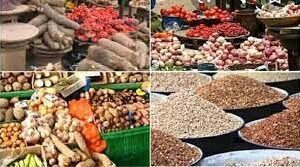The Nigerian Meteorological Agency (NiMeT) has urged Nigeria farmers to start early preparation for rainfall by acquiring inputs such as seeds, fertilisers, pesticides.
The agency added that planting should be delayed where early dry spell is expected.
The meteorological agency gave the advice at the presentation of its 2022 seasonal rainfall and temperature prediction, which guide farmers on the commencement of the farming season.
Presenting the report, NiMet Director General Prof Mansur Bako Matazu, said farmers should endeavor to plant drought tolerant variety.
“The earliest onset of the planting season beginning of planting activities is expected around February 28, 2022, in the coastal parts of the country while the onset of rainfall is expected between April and May in the central states and, eventually, between June to July in the northern states. The onset of the planting season is predicted to be normal over most parts of Nigeria with a few areas having it earlier while some will have it delayed.
“Rainfall cessation dates across most parts of the country in 2022 are predicted to be near the long-term average conditions. The window between the onset and cessation dates can be regarded as safe periods for the planting of various crops by their cropping calendars.
“The growing season is predicted to last between 250-300 days in southern parts of the country and 100 to 200 days in the north. Noteworthy are areas around Kwara, Oyo, Lagos, Nasarawa, Benue, Bayelsa and Rivers which are likely to experience shorter than normal length of the growing season. However, prolonged length of the growing season is anticipated in parts of Plateau, Kaduna, Edo and Imo.
“The use of small-scale water harvesting system such as ditches, are recommended for farmers in those areas where dry spells or below normal rainfall are anticipated,” the report advised.
It however stated that the anticipated 2022 length pf growing season is likely to benefit most arable crops planted across the north and south of Nigeria significantly.
He disclosed that so far, agricultural inputs and quality seeds have been distributed.
Meanwhile, the Permanent Secretary in the Ministry of Agriculture and Rural Development, Dr. Ernest Umakhihe, who represented the Minister of agriculture in Osun state, distributed agricultural inputs for dry season farming to smallholder farmers in Osogbo, Osun State. The items includes: 3,000 oil palm seedlings, 1500kg cashew seeds; 20,000 nos certified seed yams as well as 200 liters of path-away organic growth enhancers. Other are: 4,000 bundles of orange-fleshed sweet potatoes; 3000 bundles of cassava stems as well as various agricultural equipment and biochemicals., ginger, sesame in the north and cocoa, oi palm grown in the southern mangroves and rainforest areas are also expected to thrive well in places like Delta, Rives, Ondo, Cross Rivers and Edo.
According to the report, livestock farmers are to store animal feed in a dry place, saying hay is likely to get moldy if wet. It also urged herders to keep silage away from rain and surface water run-off to prevent caking, and to ensure that animals are not made to stand for long on wet ground and disinfect their feet using footbaths to kill any bacteria.
It further urged herders to do water budgets early, based on their experiences
with water suppliers in their area. Saying how much water is available and how much animal in stock will need.
It stated that the anticipated high temperature during the hot season is likely to have negative impacts on the health and performance of domestic animals generally. Saying poultry farming will be most affected and the effect of stress caused by elevated temperatures and high humidity can result in heavy economic losses from increased mortality and reduced productivity.
“The predicted warmer than long term average temperature in the month of January, march and April may likely affect layers feed intake and reduction in egg production and increase mortality rate. Farmers are advised to rehydrate their birds regularly. Aerate their pens ensure good sanitation and other good poultry management practices.
“Design of poultry pen should factor weather parameters and reduce stocking density during stress period. House young chicks under controlled temperatures. Never leave stagnant water in the chicken houses, as this serves as breeding areas for pathogens bacteria, fungi, etc.
But for the fish farmers, the report indicated that most part of the country are likely to experience near long term average rainfall, which according to the report may create a conducive environment for breeding of parasites and fishpond overflowing.
It therefore urged farmers to dredge out mud and weeds from pond with the aim of making it deeper to hold much water during the raining season. Adding that farmer should plant trees to provide adequate shading around the pond to maintain optimum temperature and ponds should be cleansed frequently during period of high temperature.




